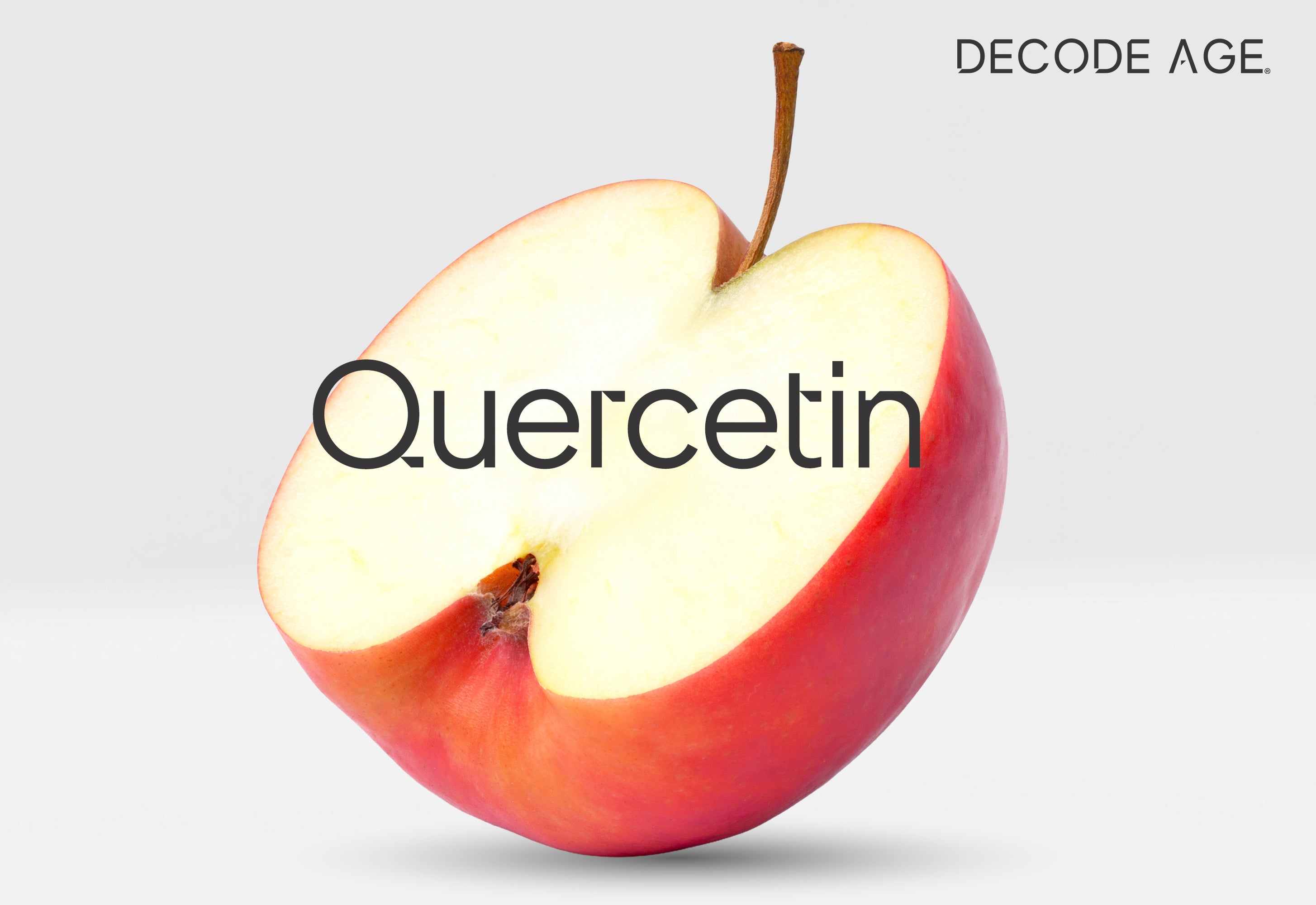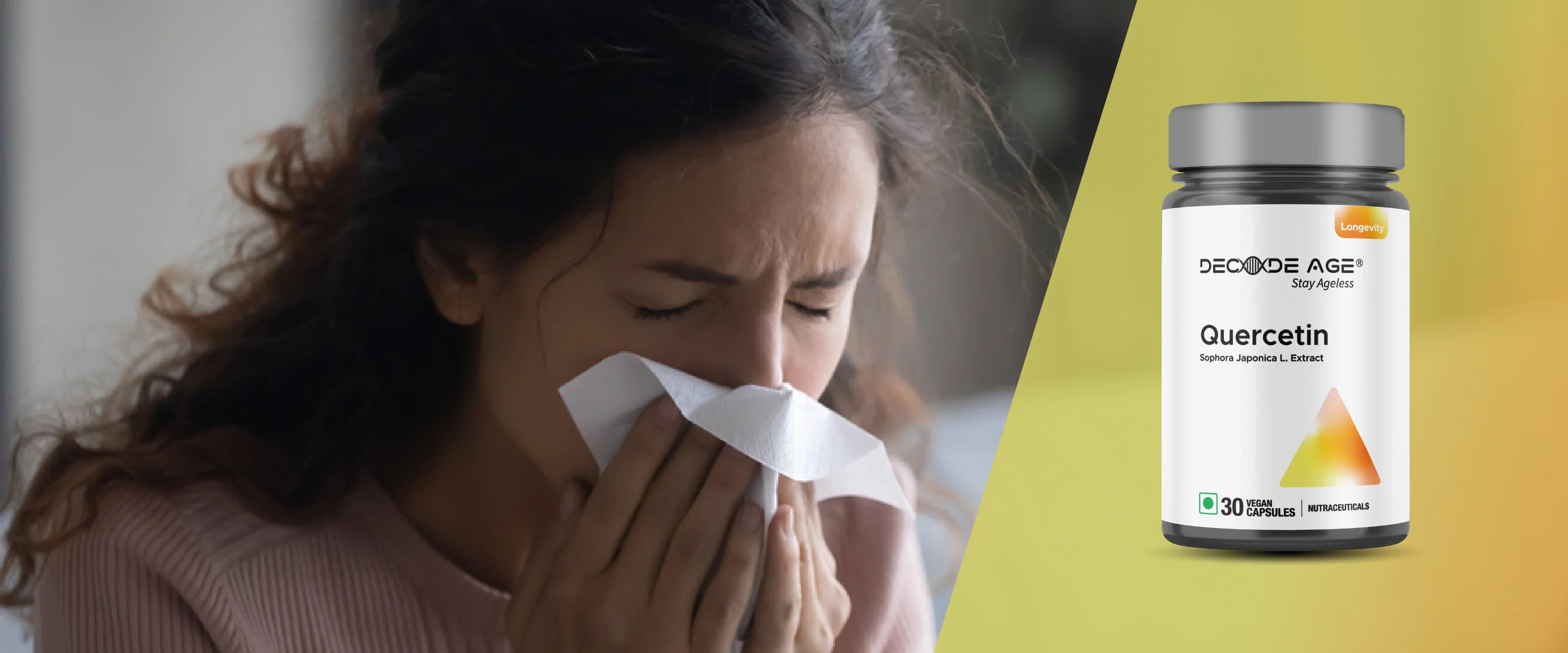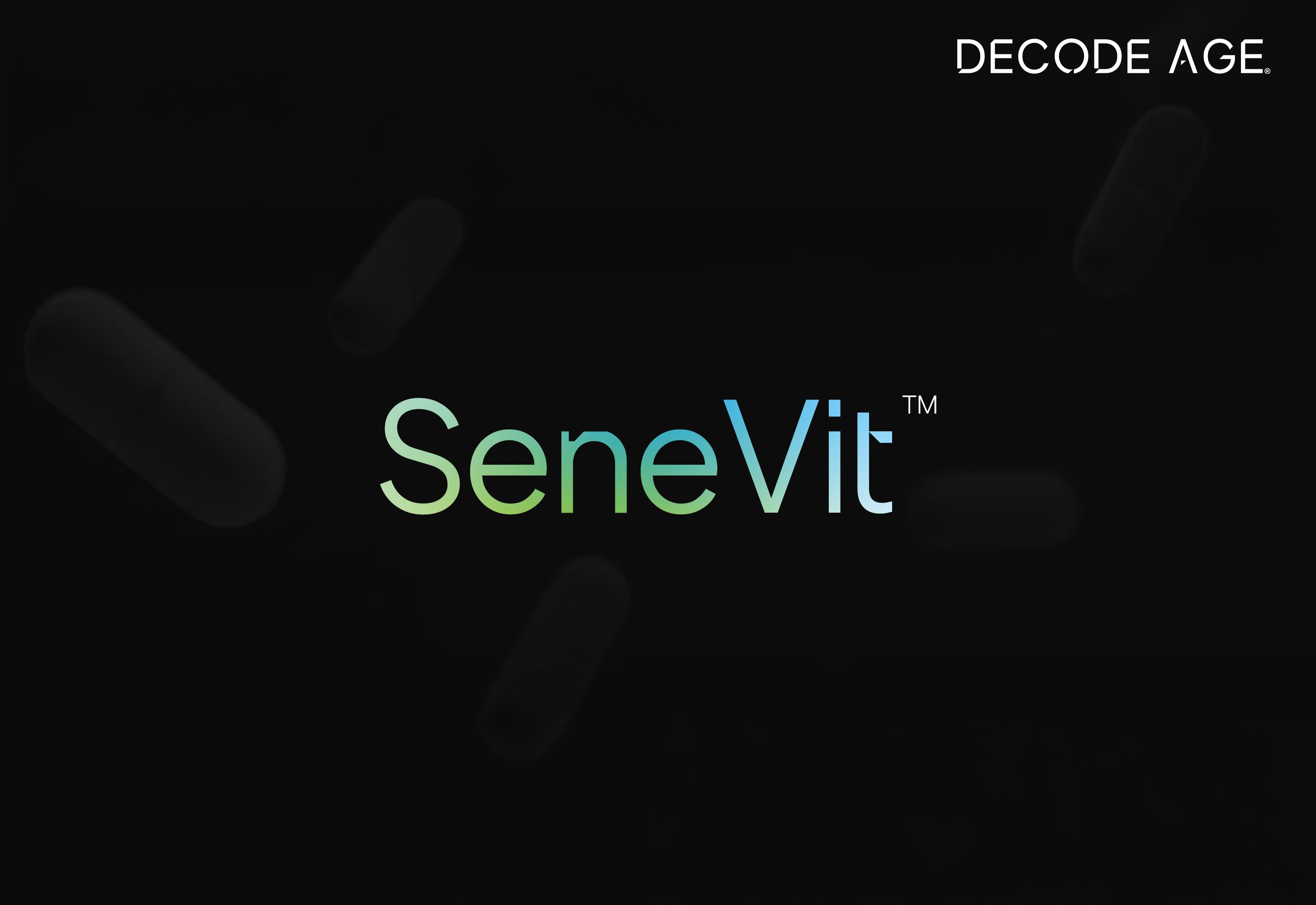We all have heard about “antioxidants” and how it is beneficial for our health. But what exactly are antioxidants? Free radicals are produced naturally in the body and can also be generated by environmental stressors. They are highly reactive molecules that can damage cellular structures, leading to inflammation and disease. Antioxidants help combat free radicals by neutralising them and preventing them from causing further damage. Eating a diet rich in fruits, vegetables, and whole grains can provide a variety of antioxidants to protect against free radical damage and promote overall health. It also prevents the cells and tissues from premature ageing.
Thus, in order to pursue a longer and healthier life, one must increase their intake of antioxidants. Even though our body has natural antioxidants such as Glutathione, its levels decrease due to several reasons. Thus, external supplementation is a requisite. One such antioxidant supplement is Quercetin. A promising anti-ageing supplement, Quercetin is a natural flavonoid found in various vegetables, fruits, and plants, that provides protection against age-associated diseases, such as heart disease. Unlike some antioxidants that the body can produce, Quercetin must be obtained through dietary sources or the best and most efficient way: through supplementation.
Quercetin Supplement Benefits
This natural flavonoid has endless health benefits that ultimately constitute longevity. Below are some of the benefits of Quercetin:
A powerful antioxidant
As mentioned earlier, the body produces free radicals which can damage cells. Quercetin has demonstrated strong antioxidant properties by neutralising and scavenging reactive oxygen species. Moreover, it has been found to possess anti-bacterial, anti-inflammatory, and anti-carcinogenic properties.
Aids in protein production
Quercetin has been shown to enhance proteolysis and maintain proteostasis. Proteostasis is a cellular process that ensures proteins are created and folded correctly for proper cellular function. The loss of proteostasis is one of the many hallmarks of ageing which can result in the accumulation of misfolded proteins, which is a contributing factor to the ageing process.
Improves neurological function
There are several benefits of Quercetin, one of which has been shown to potentially lower the risk of neurodegenerative diseases, including Alzheimer's and Parkinson's disease. These conditions are believed to be linked to the development of oxidative stress, which occurs when there is an imbalance of free radicals in the body. The antioxidant properties of Quercetin may aid in combating these free radicals.
A study conducted on mice with Alzheimer's showed that administering Quercetin injections over a period of three months helped to reverse some of the disease's markers. Furthermore, the mice performed better on learning tests, suggesting that Quercetin may have cognitive benefits in addition to its antioxidant effects.
Removes senescent cells
As we grow older, a greater number of senescent cells that are damaged and incapable of dividing tend to accumulate. Typically, the immune system eliminates these impaired cells, but with age, this defence mechanism declines, resulting in an ever-increasing accumulation of senescent cells. This build-up of senescent cells is one of the reasons behind the ageing process.
Senolytics are substances that can trigger senescent cells to undergo apoptosis or programmed cell death. Encouraging cellular self-destruction could potentially be a method for managing senescent cell accumulation.
In addition, Quercetin is known to directly induce apoptosis, and when combined with other medications, it can enhance vascular health.
Regulates blood pressure
A recent study suggests that taking Quercetin anti-ageing supplements can help lower blood pressure effectively. The study focused on overweight individuals who took a daily dose of 150mg of Quercetin and found that they had reduced levels of harmful cholesterol in their bloodstream, as well as a decrease in systolic blood pressure. (Systolic blood pressure is the measurement of the force exerted by blood against artery walls during each heartbeat)
Quercetin may help with allergies
Research indicates that Quercetin supplements can effectively prevent immune cells from releasing histamines, which are responsible for triggering allergic reactions. This antihistamine effect of Quercetin may lead to a reduction in allergy symptoms, such as runny nose, watery eyes, hives, and facial swelling.
Best Antioxidant Tablets for your health
Antioxidants are substances that protect the body from damage caused by free radicals, which are molecules produced during normal bodily processes and by external factors like pollution, cigarette smoke, and radiation. Free radicals can cause oxidative stress, which can lead to cell damage, inflammation, and various health problems.
There are many different types of antioxidants, including vitamins C and E, beta-carotene, selenium, and flavonoids like Quercetin, which we mentioned in the previous answer. Quercetin and Fisetin are one of the best antioxidant tablets that you can consume without the risk of any adverse side effects.
Anti-Ageing with Quercetin
Since Quercetin is a natural antioxidant, it is known to have anti-inflammatory and anti-ageing properties that can help protect the body against cellular damage caused by free radicals.
Research suggests that Quercetin may help improve skin health by reducing the appearance of wrinkles, promoting collagen production, and protecting against UV radiation. It may also have benefits for brain health, cardiovascular health, and immune function.
While Quercetin can be consumed through the diet, supplements are also available. However, it's important to consult with a healthcare professional before starting any supplement regimen.
Other Benefits of Quercetin
Antimicrobial and antiviral activity
Quercetin exhibits potent antimicrobial and antiviral effects. Research studies have demonstrated its ability to impede the growth of several bacterial species, including Escherichia coli, Salmonella enterica, and Listeria monocytogenes, by compromising the integrity of the bacterial cell membrane.
Moreover, Quercetin has also been found to possess significant antiviral properties against the cancer-causing human T-lymphotropic virus 1 and dengue virus type-2. By interacting with the protease enzyme responsible for viral replication, Quercetin can inhibit the initial stage of viral infection and thereby reduce the inflammation associated with infection.
Improving Cancer Risk Reduction
Cancer is a pervasive disease that can develop in various organs of the human body, necessitating novel therapeutic approaches for its treatment. Recent studies indicate that incorporating flavonoid-rich foods into one's diet can significantly reduce the risk of certain cancers while also suppressing cancer cell growth.
Improving Inflammation Reduction
Inflammation is a natural response of the body to injury and stress, typically aiding in the healing process. However, persistent inflammation can lead to detrimental health outcomes. Quercetin has been shown to stabilise histamine-releasing cells in the body, exerting anti-inflammatory and antihistamine effects. Notably, a study of women with rheumatoid arthritis demonstrated that Quercetin supplementation helped alleviate pain and stiffness.
Conclusion
In conclusion, Quercetin is a powerful flavonoid that offers numerous benefits to our health. As an antioxidant, it helps to neutralise free radicals that damage cells and its anti-inflammatory and anti-carcinogenic properties make it a promising supplement to combat age-associated diseases. Quercetin also aids in protein production, slows down skin ageing, improves neurological function, removes senescent cells, regulates blood pressure, and helps with allergies. While it can be obtained through dietary sources, supplementation is recommended to ensure adequate intake. With its ability to promote overall health and longevity, Quercetin is truly a wonder compound worth exploring.
FAQs
What is Quercetin and what are its main sources?
Quercetin is a flavonoid antioxidant found in many fruits, vegetables, and plants, such as apples, berries, grapes, tea, nuts and seeds, wine, onions, broccoli, and peppers.
What are the health benefits of Quercetin, and how does it support overall health?
Quercetin has been linked to various health benefits, such as reducing allergic response, inflammation, improving heart health, boosting the immune system, and potentially reducing the risk of certain cancers.
Can Quercetin help with inflammation and pain management?
Yes, Quercetin has anti-inflammatory properties that may help reduce inflammation and manage pain.
Is Quercetin safe to take as a supplement, and what are the recommended dosages?
Quercetin is generally considered safe when taken in appropriate amounts. The recommended dosage varies depending on the individual and their health needs, but typical doses range from 100-250 mg per day.
Can Quercetin support athletic performance and muscle recovery?
Quercetin has been studied for its potential to support athletic performance and muscle recovery; it improves endurance and reduces muscle damage.





























Leave a comment
All comments are moderated before being published.
This site is protected by hCaptcha and the hCaptcha Privacy Policy and Terms of Service apply.